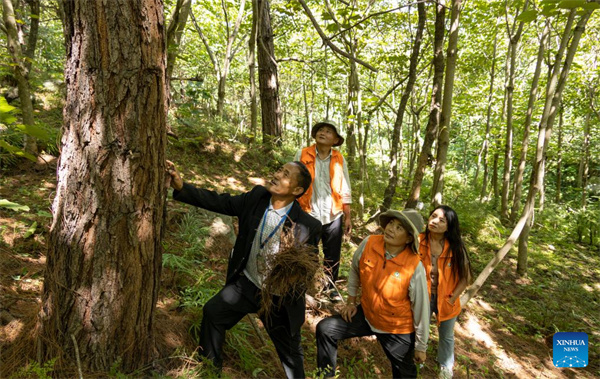Tibet Story: Forest ranger in action on "roof of the world"
Updated: 2023-09-13 (Xinhua)  Print
Print 



Zhamdu (L) checks growth of a tree in Lower Zayul town of Zayul county, Southwest China's Tibet autonomous region, Sep 3, 2023. [Photo by Tenzin Nyida/Xinhua]
LHASA -- Thirty-five years ago, Zhamdu, a villager of the border town of Lower Zayul in Zayul county, located in Southwest China's Tibet autonomous region, serendipitously embarked on a career as a forest ranger. Although he initially lacked a profound understanding of forest protection, it has since evolved into his lifelong vocation.
Lately, the 63-year-old man has been busy distributing awareness documents related to forest conservation among the local villagers.
"Knowledge about forest protection should be spread among more people to raise their awareness of the importance of preserving our forests," said Zhamdu, adding that environmental awareness is as vital as taking concrete actions.
"I can communicate fluently in both Mandarin and Tibetan, and I have extensive experience as a forest ranger. Therefore, I believe that it's my duty to engage in public awareness campaigns," he added.
Zhamdu began his career in 1988 after a friend informed him of Lower Zayul Town's recruitment of forest rangers. Previously engaged in farming, the relatively higher pay for the role of a forest ranger greatly appealed to him, prompting him to accept the job offer.
As a forest ranger, Zhamdu's job entails thwarting poaching, preventing illegal logging and forest fires, and conducting inspections to detect pest infestations in the woods.
The job is undeniably challenging. Forest areas in the township cover nearly 35,000 hectares, including pristine forests and a national nature reserve. He would trek through the forests, conducting day-long mountain patrols, and occasionally spending nights in the remote wilderness due to the secluded locations.
At the time, transportation infrastructure was poor, and the roads were in deplorable condition, making them inaccessible to vehicles. Zhamdu had to hike for two to three hours to reach the edge of the forests.
The work was never devoid of risks -- a severe injury which left his right cheek dented bears witness to that. He met with an accident on his way to the forest protection site while riding a tricycle.
Growing up in the mountainous region, Zhamdu and his family depended on logging as their livelihood. "I saw small saplings growing into towering trees, and it always pained me whenever I cut them down," he recalled.
Since becoming a forest ranger, his bond with nature has grown stronger, fostering a deeper affection for the forests. "Every time I venture into the mountains, I see these trees growing stronger, and it brings me immense joy," he said.
After spending 17 years patrolling the mountains alone, Zhamdu gained companionship when seven new forest rangers were recruited in Lower Zayul Town in 2005, and he became the team leader.
Due to his advancing age, Zhamdu can no longer take part in extensive forest treks. So, now he actively participates in training sessions frequently organized by local forestry departments, sharing forestry knowledge with the villagers. This includes instructing them on the use of firefighting equipment and tools.
At present, there are 75 forest rangers like Zhamdu safeguarding the forests across the town. In addition to their income from farming or local rural revitalization industries, they can earn more than 1,000 yuan ($137 ) monthly as forest rangers.
Situated in the Qinghai-Tibet Plateau, which is known as "the roof of the world" and "the water tower of Asia," Tibet is an important guarantor of China's environmental security.
The Chinese government attaches great importance to eco-environmental protection in Tibet. Hiring forest rangers is among the efforts to preserve the region's unique ecosystem. Thanks to such measures, Tibet has become one of the regions with the best eco-environments in the world.
From 2019 to 2020, a total of 274 million yuan was allocated in subsidies for selecting and recruiting 78,200 forest rangers in the region, and 3.18 billion yuan was granted as compensation and subsidies for forest protection to better ensure people's eco-environmental rights and interests.








